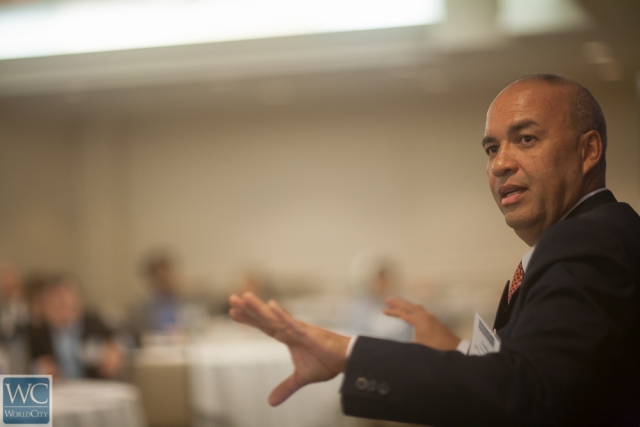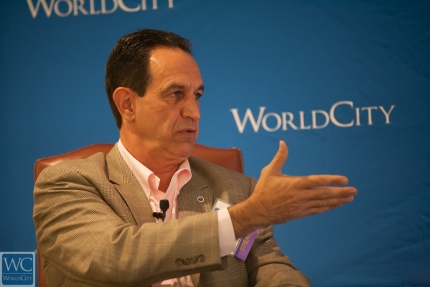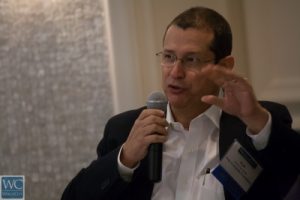High-tech exports to Latin America: Overcoming the challenges

Latin America buys tens of billions of dollars worth of high-tech products yearly, but exports to the region still face obstacles, from tough Customs procedures to high tariffs in some nations.
Overcoming those hurdles were among topics discussed at WorldCity’s Trade Connections on Oct. 17 featuring two Miami executives active in exporting high-tech goods to Latin America.
Their advice matters, because Miami serves as the U.S. hub for high-tech exports to Latin America, shipping out cellphones, computers, printers, video-game consoles and many more items.
In cellphones, Miami has led all U.S. Customs districts in exports for more than a decade, thanks to Latin America’s purchases. Miami’s cellphone exports through July this year totaled $2.75 billion, nearly double the tally five years ago, said WorldCity President Ken Roberts.
Managing that growth presents major challenges.
Many high-tech importers and distributors in the region lack the human resources and financial capacity to scale up effectively, said Ubaldo Lopez, Latin America sales director for Hewlett-Packard Financial Services.
Companies that can help partners in the region with financing can gain a competitive edge, said Lopez. Plus, it pays to hire specialists to master such complexities as Brazil’s tax and Customs rules.
Innovative logistics also can help, including air-sea transport combinations that cut delivery times, said Mario Alfonso, managing director in Miami for Delmar International Cargo, a Canadian company that set up its Latin American headquarters in South Florida in 2011.
“We’re doing well as a hub in Miami, but to remain that, we need to see how we can add more value,” said Lopez, suggesting greater focus on finance, logistics, software and consulting for the future.
Security in warehouses and beyond
Also posing a serious challenge: security for the high-value goods.
The risk of theft comes not only from warehouse workers but also from truckers and others who come in and out of warehouses. More people now can access information about the high-value shipments, because documents are computerized and available in data-bases, said Alfonso.
“The rewards are very high for criminals, and the penalties are relatively low, compared to drugs,” said Alfonso. Punishment can be just two years in jail for millions of dollars in cargo stolen in the Miami area.
One new approach to security: Install low-cost GPS devices in boxes of high-value items. But not all airlines allow those devices, because they use lithium batteries that some carriers see as hazardous.
Another option: Keep products in a “foreign trade zone,” a federally-designated area where imports can be stored duty-free before re-export, suggested Jorge Suarez, marketing manager of the Miami Free Zone. Theft from U.S. foreign trade zones carries stiffer penalties mandated by federal law. 
Yet to use foreign trade zones, shippers usually need to have significant volumes, said Alfonso.
“Companies that deal with these products need to be vigilant,” said Alfonso, noting that Delmar even sends an escort to accompany high-value shipments sometimes. “It’s a never ending challenge.”
What’s hot and what’s not
Within Latin America, prospects for growth vary widely by country and by product.
Nations in the Pacific Alliance — Mexico, Peru, Colombia and Chile — are the most liberal in their policies and faster growing, speakers said. Others in eastern South America with more regulated markets are more complicated for sales. Venezuela and Argentina now rank among the toughest for business.
The product mix is shifting too. Cellphones and tablets are gaining ground, displacing some demand for personal computers, Roberts said. And even bigger changes lie ahead for information technology.
“There are cheaper and cheaper sensors, plus artificial intelligence and better communications. You will see traditional IT joining robotics,” said Lopez. “You’ll see more robotics trade five years from now, and you’ll see more services, as that technology is exported.”
Where do you see the greatest opportunities for services?, asked Max Shelford, business development manager at software firm Vista Technologies.
Opportunities abound in helping retailers and others grow their businesses , said Lopez. That might mean innovations in online payment systems for banks, point-of-sale terminals for stores or new software for oil exploration, now that Mexico is opening its oil fields to foreign investment, Lopez said.
Latin America as site for high-tech manufacturing, services
What chances do you see to bring manufacturing of high-tech goods back from Asia to the Americas?, asked Polo Coronado, a supply chain and operations specialist at Polo Coronado Consulting.
It all depends on costs, said Lopez. HP does some manufacturing in Brazil, and in Mexico, it makes select items for sale worldwide. But the bulk of HP products come from Asia, where the company can easily find supplies and where labor is relatively inexpensive.
“The driver [for production decisions] is not regional,” said Lopez. “It’s costs.”
But companies tend to focus too much on production costs and not enough on “landed” costs, which also include outlays such as legal fees, loss of intellectual property and travel time, added Coronado.
Where Latin America is becoming more globally competitive is back-office operations, said Lopez.
For example, HP now ranks as the largest private employer in Costa Rica because of its contact-center there. That center mobilizes about 6,000 people to handle phone calls, emails and other contacts for HP customers in Spanish and English, he said.
HP also handles much of its finance and accounting for the Americas in Mexico’s Guadalajara, a growing hub for foreign investment and universities.
“You go to Guadalajara, and you feel the energy,” said Lopez. “It’s kind of the Silicon Valley of Mexico.”
Trade Connections is one of six event series organized by WorldCity to bring together executives on international business topics. The Trade series is sponsored by PortMiami, Miami-Dade Aviation, American Airlines Cargo and HSBC bank.
The next Trade Connections is set for Dec. 10 to discuss the import-outlook forecast for 2015.